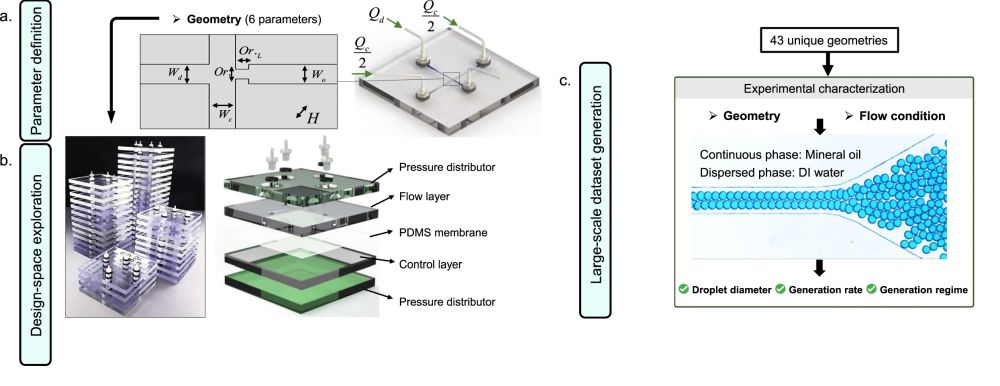
06 Jan Machine learning based platform for design and optimization of microfluidic droplet generators
In recent years, microfluidics platforms have progressed and resulted in the emergence of advanced droplet-based microfluidic systems that have gained significant attention in biology and chemistry research. Droplet microfluidic chips are capable of generating uniform droplets at ~kHz frequencies which makes them an ideal option for high-throughput assays. Droplet generators are perfectly suitable for high-throughput single-cell analysis, enzyme library screening, optimization and production of recombinant proteins, etc. Droplet microfluidic devices are also a good fit for generating micro/nanocarriers for microfluidic drug delivery. A wide range of hydrogels have been adapted to droplet microfluidic devices and generated using droplet generators which makes its application even broader. This wide range of applications attracts researchers from various disciplines with often limited knowledge about the design and optimization of such chips which can limit its popularity. This in turn calls for easy-to-use and precise platforms for the design and optimization of droplet generator chips.
A multidisciplinary research team at Boston University has recently employed machine learning techniques to prepare a web-based tool to predict the performance of droplet microfluidic chips and enable design automation of flow-focusing microfluidic droplet generators. The results were published in Nature Communication and the codes are available for public access.
“We capitalize on machine learning algorithms to predict the droplet diameter and rate with a mean absolute error of less than 10 μm and 20 Hz. This tool delivers a user-specified performance within 4.2% and 11.5% of the desired diameter and rate.”, the authors elaborated.

Reproduced under Creative Commons Attribution 4.0 International License. Lashkaripour et al., Nat. Commun., 2021.
The group took advantage of rapid microfluidic manufacturing techniques to microfabricate 43 flow-focusing droplet generators and evaluate their performances over a wide range of flow conditions. There are 6 main geometrical parameters that can vary in a microfluidic flow-focusing droplet generator namely, orifice width, orifice length, water inlet width, oil inlet width, and the device thickness. All these parameters were varied to account for the geometrical changes as well as flow conditions and fluid properties. This is necessary to prepare a fairly large data-set required for the machine learning algorithm. Additionally, the team designed a tool for designing a droplet generator based on the user’s specifications.
The preliminary tests resulted in 998 experimental data points correlating to dripping and jetting regimes and droplet diameters of 27.5-460 µm, generation frequencies of 0.47-818 Hz. The current web-based tool supports droplets made with DI water as the aqueous phase and mineral oil as the oil phase.

Reproduced under Creative Commons Attribution 4.0 International License. Lashkaripour et al., Nat. Commun., 2021.
“We presented a web-based open-source tool that leverages machine learning to accurately predict the performance of flow-focusing droplet generators. This enabled us to build a design automation tool that takes user-specified performance as input and provides a geometry and flow condition to achieve the desired performance in return, thus, eliminating the need for resource-intensive design iterations.”, the authors concluded.
Read the original article: Machine learning enables design automation of microfluidic flow-focusing droplet generation

Pouriya Bayat
Pouriya is a microfluidic production engineer at uFluidix. He received his B.Sc. and M.A.Sc. both in Mechanical Engineering from Isfahan University of Technology and York University, respectively. During his master's studies, he had the chance to learn the foundations of microfluidic technology at ACUTE Lab where he focused on designing microfluidic platforms for cell washing and isolation. Upon graduation, he joined uFluidix to even further enjoy designing, manufacturing, and experimenting with microfluidic chips. In his free time, you might find him reading a psychology/philosophy/fantasy book while refilling his coffee every half an hour. Is there a must-read book in your mind, do not hesitate to hit him up with your to-read list.


